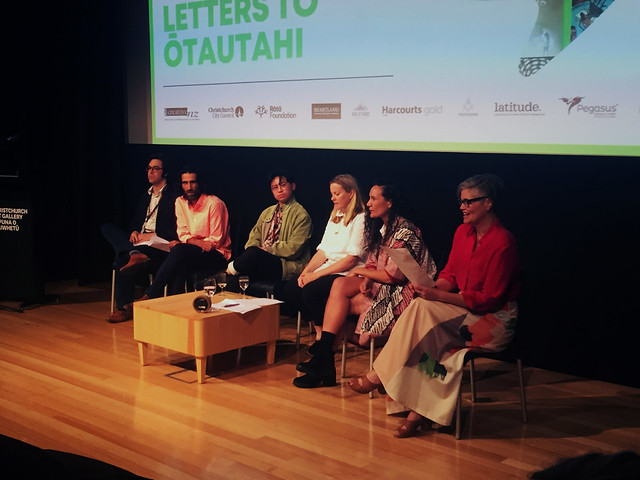I grew up in Christchurch and to say that it's seen its fair share of change in the last decade or so would be putting it mildly. My personal relationship with Ōtautahi is multi-layered and complicated but I have no idea how I'd go about addressing it in a letter.
Fortunately that was a job for an assemblage of writers who all had something different and interesting to say about our beloved (and sometimes bedevilled) city.

First to read was Juanita Hepi (Kāi Tahu, Ngāti Mutunga, Ngāi Tukairangi), writer/actor/director/researcher who is currently doing a a Masters in Māori and Indigenous Leadership. Her letter was sometimes poetry, often history, taking in, as it did, Kāi Tahu origins (via the four sons of Rakinui), tribal migration and intermingling, important dates such as the 1848 Canterbury purchase (also known as Kemp's deed), the first formal statement of grievance by Matiaha Tiramōrehu just one year later, and on, and on. An ode to the future and the past.
Poet Nathan Joe's letter to a city that he has left and since returned to was, like any relationship that has been on-gain off-again... complicated.
Moving back to Christchurch is like falling back in love with an ex. Gross.
Yes, there were things he liked about Ōtautahi but he broke up with it for a reason, not feeling like there was a place for him. Still, he had a sense of humour about it and his letter was full of pithy one-liners and painful truths.
It's easy to hate someone who has seen you at your worst.
Behrouz Boochani, who only arrived in Christchurch 10 months ago, had an entirely different perspective on the city, and wrote his letter not to Ōtautahi, but as to a friend describing it. Among the things he remarked on were that initially the only people he knew or associated with were middle class, but he came to learn about the marginalised in society and that there are children living in poverty here so it is not quite the paradise it initially seemed. He is impressed with the elements of Māori culture he sees everywhere and draws comparisons with similar struggles being faced by Kurds at home, who are prohibited from learning Kurdish at school, so what will happen when the old men and women die?
Other observations of Ōtautahi were more day-to-day. He found it remarkable that so many people would smile at a stranger while out for a walk. That rugby is a religion (one that he is not enraptured by, preferring to ride his bike to the ocean to watch birds). That people are disgusted by smoking, "it seems that they have put up these signs just for me," he said. And most damningly:
I have never met a Kiwi who does not drink.
Getting an insight into how someone else sees you is always illuminating and Boochani's letter captured a lot about us that we probably take for granted.
Writer Lil O'Brien's letter illustrated that the way we feel about a city is really the way we feel about the people in it. For her Ōtautahi is the place that she grew up and felt loved... until she didn't. She described her teenage longing for films featuring women in which "an intense friendship develops" and her preference for laddish mags featuring bikini-clad centrefolds. That she didn't really know what any of this meant to start with but once the revelation was made to her family a line was drawn that separated her life into "before" and "after".
They didn't want to know what made me happy because it didn't make them happy.
She finished with the sad but sympathetic, "Dear Christchurch, I know it's not your fault".
Poet Erik Kennedy took things in a different direction again switching things from a monologue to a dialogue as he and Ōtautahi exchanged letters, at first of introduction "I've fallen in love with someone who lives in you" and "I don't feel very well some days" and later discussing Kennedy's role as a poet, and what a meaningful part of a city's life art must necessarily be (it's not all about capitalism, okay?).
...even the bean counters turn to art for solace.
This was one of those sessions where you had no idea what you were going to get from the different talents involved but it offered up a really diverse and illuminating range of voices with interesting things to say about this place we call home.
More information
- WORD Christchurch website (for the full programme and info about authors)
- Follow WORD Christchurch on Twitter and Facebook
- Read our WORD Christchurch Spring Festival 2020 coverage



Add a comment to: WORD Christchurch: Letters to Ōtautahi